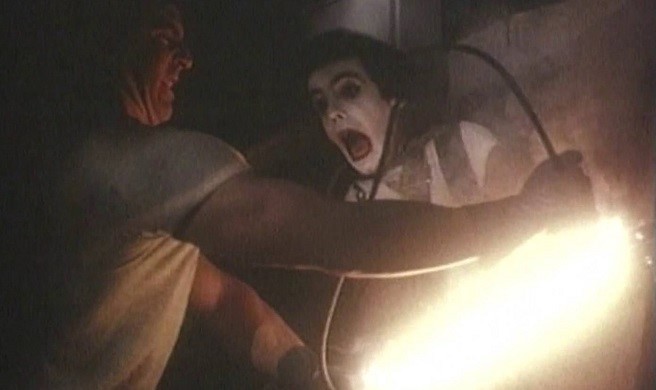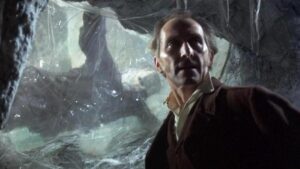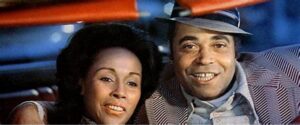Directed by Robert Altman
Written by Jules Feiffer
Starring:
- Robin Williams as Popeye
- Shelley Duvall as Olive Oyl
- Ray Walston as Poopdeck Pappy
- Paul Dooley as Wimpy
- Paul L. Smith as Bluto
- Richard Libertini as Geezil
Rating: ![]()
Breathtakingly atrocious, hideously gaudy, and exasperatingly misguided—Popeye is a live-action cartoon so tonally dissonant and aesthetically perverse that it demands not just criticism, but an entire lexicon of vituperation. And yet, for all its grotesque miscalculations, it remains a singularly fascinating specimen—an artistic calamity rendered almost mesmerizing by the pedigree of its collaborators. Based on E.C. Segar’s beloved comic strip and filtered through the vision of New Hollywood iconoclast Robert Altman, Popeye boasts the involvement of lauded screenwriter Jules Feiffer, legendary cinematographer Giuseppe Rotunno, and an ensemble cast uncannily suited to their roles. How such formidable talent could culminate in such chaos is the paradox at the heart of this cinematic curiosity.
Despite its prestige, the film collapses under the weight of a screenplay that seems blithely unaware of the constraints of live-action filmmaking. Feiffer, whose talents are more comfortably housed in the animated realm, approaches the script with cheerful naiveté—his intentions evidently earnest, his execution disastrously ill-conceived. His screenplay plays like a storyboard for a Saturday morning cartoon, brimming with visual gags and elastic rhythms wholly incompatible with the gravitational logic of the physical world. In trying to materialize Feiffer’s cartoonish imaginings, Altman is left to chase an unfilmable phantom, forced to simulate the anarchic spontaneity of animation with real actors, props, and sets—an effort that inevitably founders.
Worse still is the involvement of Paramount Pictures and Walt Disney Productions, whose co-production lends the film an air of corporate incoherence. Their mutual detachment from the reality of filmmaking results in a product that feels less like a film than a misconceived theme park attraction. The tonal imbalance is staggering—an awkward blend of slapstick comedy, off-kilter musical numbers, and narrative inertia that never quite gels. The songs, composed by Harry Nilsson, drift in and out of the film like aimless interjections rather than narrative anchors, and the slapstick gags land with a thud, their timing lost in a fog of misdirected theatricality.
The story, such as it is, follows the sailor Popeye (Robin Williams, in his feature debut) as he arrives in the tax-ridden town of Sweethaven in search of his long-lost father. There he meets the neurotic Olive Oyl (a pitch-perfect Shelley Duvall), the burger-obsessed Wimpy (Paul Dooley), and the menacing Bluto (Paul L. Smith). There are glimmers of charm in these interactions, and the world Altman conjures—part rusted seaside carnival, part bureaucratic nightmare—is visually distinctive. Rotunno’s cinematography, though pallid and strange, gives Sweethaven a decaying storybook quality, and the set design, though grotesque, is undeniably committed to its cartoonish vision.
But style is no substitute for substance. The film’s greatest sin is not its aesthetic eccentricity, but its structural incoherence. Altman, known for his ensemble storytelling and elliptical rhythms, attempts to apply his signature fragmentation to material that cries out for clarity and propulsion. The result is not whimsical, but wearying. Every attempt to reconcile the kinetic madness of animation with the inertia of live-action ends in an awkward compromise. The gags are not funny; the music is not memorable; and the pacing is more soporific than sprightly.
And yet, one cannot entirely dismiss Popeye, because, paradoxically, its few surviving virtues belong to the very artists absolved of blame. The cast is uniformly exceptional. Robin Williams imbues Popeye with a curious tenderness beneath the mumbled gruffness; he may look bewildered, but he is never insincere. Paul L. Smith’s Bluto is all brute force and scowling menace—he seems to have lumbered straight off the comic strip. But it is Shelley Duvall’s Olive Oyl who steals the show. Her performance is so uncannily precise, so effortlessly exasperating, that it becomes a kind of comic poetry. Duvall doesn’t just portray Olive Oyl—she is her, body and soul.
One suspects that at some point during production, the creative team recognized the ungainly beast they were birthing and chose to lean into the one thing that still functioned: the actors. Their comedic commitment animates even the film’s most lifeless stretches, salvaging moments of surreal enchantment from an otherwise inert spectacle.
Ultimately, Popeye is a film that aims to be many things: a family-friendly musical, a live-action cartoon, a satirical fantasy. It ends up being none of them. What remains is a grotesque pastiche—a tonal cacophony and aesthetic paradox. It is a noble failure, perhaps even a brave one, but a failure nonetheless: one that testifies to the dangers of adapting the lawless dream-logic of animation to a medium that cannot bend quite so far without breaking.









